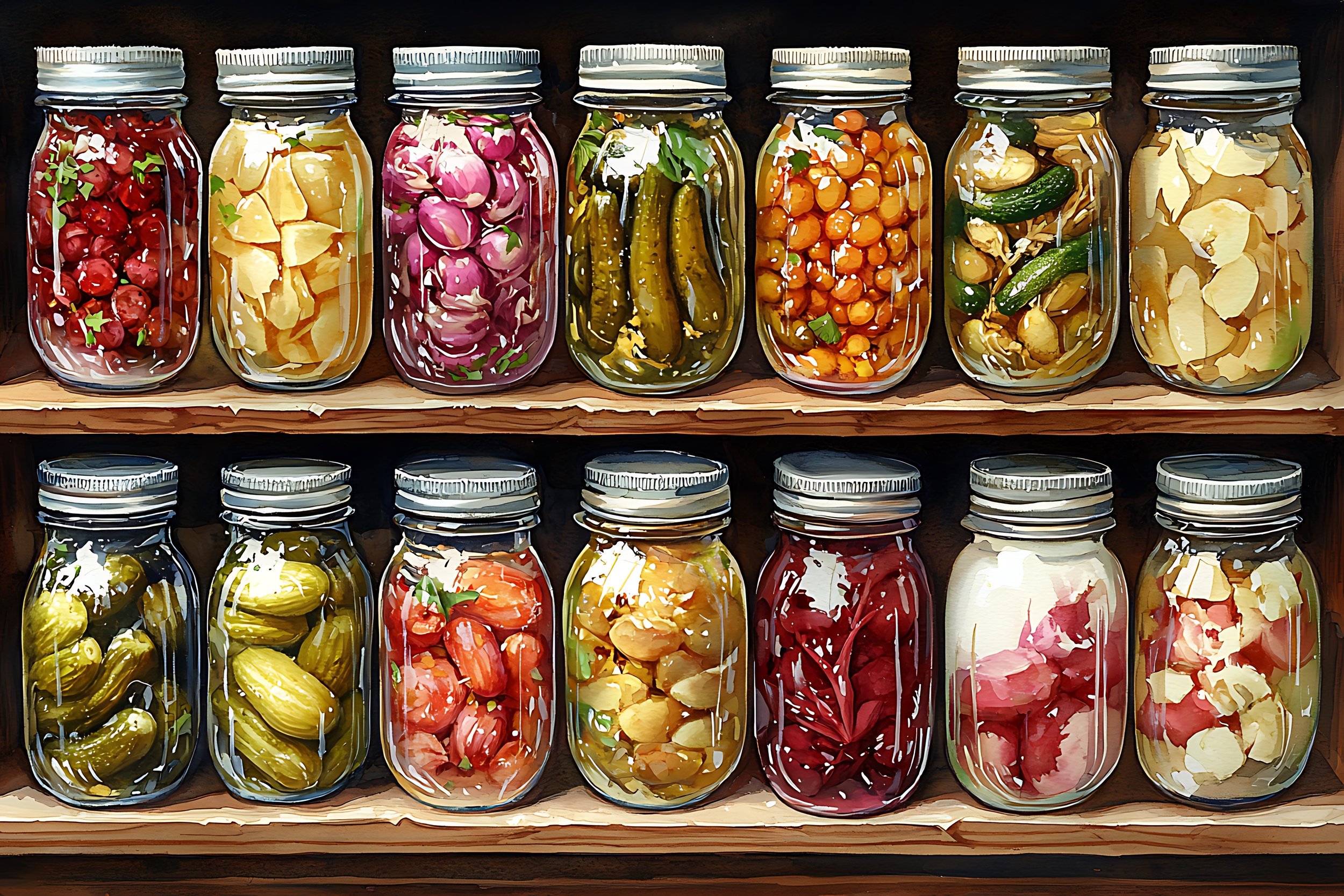
Our Pantry
Eating healthy is a real challenge. Fruits, vegetables, nuts, and grains are sprayed with toxic pesticides. Livestock and seafood eat farm-fed diets that alter their nutritional value. Processed foods are filled with hormone-altering additives. Even our water supply can be tainted. Municipalities add toxic chemicals like fluoride, and well water needs to be tested for agriculture run-off.
This is our master health food shopping list, compiled from multiple sources.
Generally, we shop at Amazon.com, Sam’s Club, Thrive Market (online), Trader Joe’s, Polyface Farms, River Hill Farm, South Mountain Creamery, Yoder’s Market, and Whole Foods. The sources for key foods are noted.
Produce
If a fruit or vegetable is listed as “Organic,” only buy organic. These fruits and vegetables are on the EWG.org “Dirty Dozen” list and should be avoided due to dangerous pesticide usage on conventional produce. Remember to avoid these foods in restaurants as well. If you don’t see an item on the list, it is probably best to skip it. You won’t find modern corn, white potatoes, or whole grains on this list. They are high in lectins or gluten and are not historically part of a healthy diet. The white potato was not popularized in Virginia until after the American Revolution and whole grains were not popularized until the mid-19th century.
Vegetables, in season, can be found at Whole Foods, Trader Joe's, and Sam's Club.
Cruciferous Vegetables should be eaten daily.
Arugula
Bok choy
Broccoli
Brussels sprouts
Cabbage
Green and Red Cauliflower
Organic Collard Greens
Organic Kale
Kohlrabi
Swiss chard
Watercress
Only eat if these vegetables if pressure-cooked or fermented.
All dried beans (Thrive Market)
Organic Chickpeas
Organic Green/string beans
Legumes
Lentils
Peas
Sugar snap peas
Only eat these fruits and vegetables if seeded, skinned, pressure cooked or fermented.
Cucumbers
Eggplant
Organic Peppers — avoid if autoimmune
Pumpkins
Squash
Organic Tomatoes — avoid if autoimmune
Resistant starches should be eaten in moderation.
Cassava
Celery root
Green bananas
Jicama
Millet
Parsnips
Persimmon
Organic hominy — pressure cook only
Organic Indian Basmati Rice — pressure cooked only
Rutabagas
Sorghum
Sweet potatoes or yams
Turnips
More Healthy Vegetables
Artichokes
Asparagus
Avacado — prepackaged only (not native and mold issues occur)
Bamboo shoots
Basil
Beets — best eaten raw
Carrots — best eaten raw
Organic Celery
Chicory
Chives
Endive
Frisée
Garlic
Garlic scapes
Ginger
Hearts of palm
Horseradish
Jerusalem artichokes
Leeks
Lemongrass
Mesclun
Mint
Mushrooms
Organic Mustard greens
Okra
Olives
Onions
Parsley
Parsnips
Radicchio
Radishes
Red- and green-leaf lettuces
Romaine lettuce
Rutabaga
Seaweed and algae
Shallots
Organic Spinach — avoid if autoimmune
Fermented foods — pickles, sauerkraut, etc.
Virginia Fruits
Half of the sugar in fruit is fructose, so though fruit has nutritional value, it should always be eaten in moderation. Our ancestors would have eaten fruit in season. Eat fruit just once a week and only in season. Here are the seasons to eat fruits in Virginia. If the fruit is listed as organic, only eat organic to avoid pesticides. Pineapples have been imported from the Caribbean since the 1700s and are a symbol of fine Virginian hospitality.
Fruits, in season, can be found at Whole Foods, Trader Joe's, and Sam's Club.
WINTER
No local options.
Citrus, all types
Kiwis (eat skins)
Caribbean Pineapple
SPRING
Apricots
Cherries
Organic Strawberries
SUMMER
Organic Blueberries
Organic Blackberries
Elderberry
Organic Nectarines
Organic Peaches
Organic Plums
FALL
Organic Apples
Cranberries
Fig
Organic Pears
Pawpaw
Persimmon
Pomegranates
Organic Raspberries
Dairy
Not all dairy comes from cows. Sheep, goats, and buffalo make excellent dairy products. If you are using cow products, always ensure they are A2 cows. A2 dairy from Guernsey and Jersey cows can sometimes be found in Virginia. Virginia has been importing cheese from Europe since the early 1600s. Dairy from France, Switzerland, and Italy also use A2 cows. The list of dairy products from these regions is endless, and our favorites are included. Dairy should always be eaten in moderation.
We shop at Whole Foods and Trader Joe’s for most dairy. Sam’s Club sells great A2 cow, sheep, and goat cheeses from Europe.
Butter
A2 organic butter - grass fed
Buffalo milk butter
Tallow - grass fed
Milk Products
A2 organic milk
Goat milk
Sheep milk
Heavy whipping cream
Organic crème fraîche
Yogurt — always plain
A2 organic yogurt
Coconut milk yogurt
Goat milk yogurt — Trader Joe’s
Sheep milk yogurt
Buffalo Cheeses
Buffalo Mozzarella — US
Mozzarella di bufala campana — Italy
Ricotta di Bufala Campana — Italy
Cow Cheeses
A2 organic cottage cheese
Asiago — Italy
Brie and soft cheeses — France
Fontina — Italy
Gruyère — Switzerland
Lustenberger — Switzerland
Moine — Switzerland
Mozzarella and soft cheeses — Italy
Parmigiano-Reggiano — Italy
Raclette — Switzerland
Goat Cheeses
Bucheron — France
Chabichou Du Poitou — France
Chevre d'Argental — France
Garrotxa — Spain
Goat’s Milk Brie — US
Goat’s Milk Cheddar — US
Goat’s Milk Log — US
Mobay Goat and Sheep — US
Queserias del Tietar — Spain
Sainte-Maure — France
Sheep Cheeses
Brebirousse D'Argental — France
Fiore Sardo — Italy
Idiazábal — Spain
Manchego — Spain
Pecorino Romano — Italy
Pyrenees Truffé — France
Feta — Greece
Finding healthy proteins is a real challenge. Always choose wild-caught or pastured for the most nutritious meats, poultry, and seafood. Sam’s Club carried some great grass-fed beef, wild-caught shrimp, scallops, salmon, and often pastured eggs. Whole Foods has a great seafood counter, but not everything is wild-caught. Polyface Farms will ship pastured chicken, lamb, rabbit, turkey, pork, and beef. South Mountain Creamery will deliver local meat, but you must check each source to assess whether it is grass-fed or pastured. If you have freezer space, River Hill Farms sells beef by the quarter cow.
Don’t forget to add variety to your protein consumption. When was the last time you ate pheasant, goose, clams, or rabbit?
Wild Caught Seafood
Only eat wild-caught seafood.
Alaskan salmon
Anchovies
Bluefish
Chesapeake Rockfish
Clams
Pacific Cod
Chesapeake Blue Crab
Crawfish
Flounder
Lobster
Mussels
Eastern Oysters
Perch
Salmon
Sardines
Scallops
Shad
Shrimp
Squid
River Trout
Pastured Poultry
Poultry, including eggs, should always be pastured.
Chicken
Chicken eggs — always pastured
Dove
Duck
Duck eggs
Guinea Fowl
Goose
Turkey
Ostrich
Pheasant
Ruffed Grouse
Quail
Quail eggs
Red Meat
Try to limit to once a week.
Bear
Boar
Elk
Fermented Hard Sausage
Grass-fed and grass-finished Beef
Pastured Bison
Pastured Lamb
Pastured Pork
Rabbit
Venison
Up to ½ cup per day.
Almonds — only blanched or Marcona
Basil seeds
Brazil nuts — no more than 3 a day
Chestnuts
Coconut
Unsweetened Coconut milk and cream
Flaxseeds — ground fresh
Hazelnuts
Macadamia nuts
Pecans
Organic peanuts (does have lectins)
Pine nuts
Pistachios
Sesame seeds
Walnuts
Nuts and Seeds
Oils
Some oils are high in linoleic acid and extremely unhealthy. If it’s not on this list, it should be avoided.
Coconut oil
MCT oil
Organic Olive oil, extra-virgin, first cold pressed
As a general rule, processed foods should be avoided. Look at the ingredients list; if it is not in your kitchen, you probably don’t want to eat it. Here are a few exceptions that should be consumed sparingly. Nut butter should have one ingredient — nuts.
Cappello’s pasta
Hazelnut butter
Organic peanut butter (contains lectins)
Siete chips
Millet pasta
Sorghum pasta
Organic real sourdough bread
Thrive Market organic coconut flakes
Trader Joe’s Jicama wraps
Trader Joe’s Organic French Baguette
Trader Joe’s All Butter Puff Pastry Sheets
Trader Joe’s Pie Crusts
Trader Joe’s Cauliflower Gnocchi
Trader Joe’s Coffee Ice Cream
Trader Joe’s Mint Chip Ice Cream
Processed Foods
Organic herbs and spices should be safe. However, red pepper flakes and cayenne pepper do contain lectins. Condiments with seed oils, corn syrup, added sugars, maltodextrin, starches, and “natural flavors” should be avoided. Here’s what’s in our pantry.
100% olive oil mayonnaise
Coconut Secret Asian sauces
Ceylon cinnamon — superior to all others
Fish sauce
Fortnum and Mason — herbs, spices and some condiments
Crushed Garlic Cubes
Crushed Ginger Cubes
Lea and Perrins Worcestershire Sauce — only this brand
Miso paste
Mustards
Nielsen-Massey vanillas — avoid imitation vanilla
Sea salt — always iodized
Simply Organic — herbs, spices, seasonings and extracts
Tahini
Thrive Market — organic herbs, spices and seasonings
Tomato Paste
Vinegar
Wasabi
Herbs, Spices, and Condiments
Our wheat supply is wholly corrupted. It is not just the gluten and the wheat germ agglutinin but also the proteins in our modern wheat, as they have been bred for maximum yield. Avoid all wheat products. If you must have wheat flour, use organic flour from France if possible. Beware of gluten-free products. They often add sugars and high-lectin flours, which negate their health benefits.
Arrowroot powder — a great starch
Cassava flour
Coconut flour
Hazelnut flour
Millet flour
Sorghum flour
Sweet potato flour
Tapioca flour
Tiger nut flour
King Authur’s Organic All-Purpose Flour — contains lectins and gluten
King Authur’s Organic Bread Flour — contains lectins and gluten
Flours
Sugar is never a health food, and most sugar substitutes are worse. When you must eat sugar, make sure it is organic. Here are the sugar substitutes in our pantry. Foods with Monk Fruit, Inulin, and Xylitol are also probably safe to eat in moderation.
Local honey
Organic maple syrup — Highland County Virginia syrups recommended
Allulose — RxSugar and Wholesome (a prebiotic)
Stevia — Sweetleaf
Sweeteners
Chocolate
Dark chocolate, unsweetened, 72% cacao or greater (1 ounce per day)
Non-dutched cocoa powder, unsweetened
The Bar and Beverages
So, is alcohol good for you? There might be health benefits to high-quality wines and whiskeys, and they are probably healthier than a sugary soft drink or fruit juice. Moderation is key. At most, one drink a day for ladies and two for gentlemen. Also, what you drink matters. Beer and sugary cocktails have no redeeming value. The US wine supply can be toxic. So carefully select your libations. Our favorites and brands are listed below.
Our Essential Bar
Amaretto
Brandy — Hennessy, Courvoisier and Lairds
Bourbon — River Hill, Heaven’s Door and Four Roses
Campari
Cointreau
Grand Marnier
Gin — Hendricks, Monkey 47 and Drumshanbo
Irish Whiskey — Knappogue Castle and Jameson
Pernod
Pimms
Rum — Havana Club, Kraken and Appleton
Rye — River Hill and Old Overholt
Saint Germain
Scotch — Glenfiddich, Balvenie and Tallisker
Wine
Red Wine — organic, dry farm, biodynamic and preferably from France
White Wine — organic, dry farm, biodynamic and preferably from France
Champaign — organic, dry farm, biodynamic and preferably from France
Vermouth — Noilly Prat Extra Dry and Dubonnet Rouge
Cider
This old Virginia favorite from colonial days, cider should be organic and dry without additives like sulfites.
Lost Boy Cider — Alexandria
Potter’s Craft Cider — Charlottesville
Willow Oaks — Middletown, Maryland
Non-Alcoholic
All teas — Fortnum & Mason and Harney & Sons
Coffee — Bulletproof, Illy, and other coffee roasted and imported from Europe
European Swiss water processed Decaffeinated Coffee
Water — the cleanest possible
San Pellegrino — in glass bottles
Bitters —a great addition to still and sparkling water













